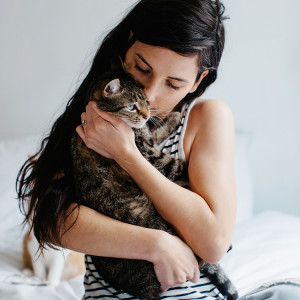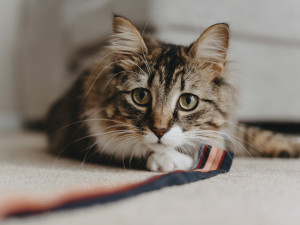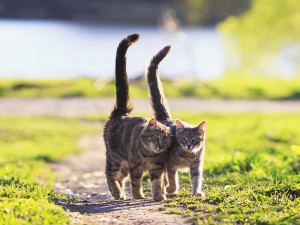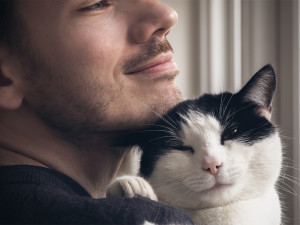Can Cats Sense Pregnancy?
Yes, cats can detect pregnancy in humans.
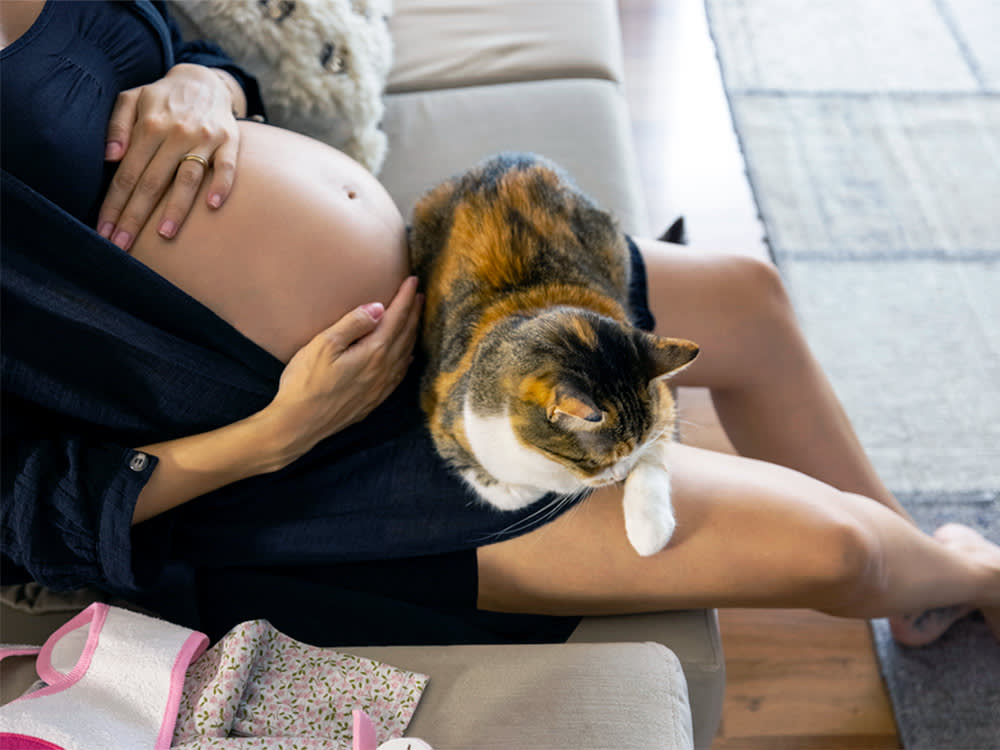
Share Article
In This Article:
Do Cats Sense Pregnancy? How Early Can a Cat Sense Pregnancy? Can Cats Sense Pregnancy Hormones? Ways Cats May React to Your Pregnancy Why Do Cats React to Pregnancy? Frequently Asked Questions
Yes, cats can sense when their owners are pregnant. Your cat can detect your pregnancy through the change in routine in their household, though they might also be able to sense a human’s pregnancy through through their sense of smell.
Can cats sense pregnancy?
Many pet parents swear their cats can sense their pregnancy, but there’s not really any scientific proof. Yet, veterinarians and behaviorists I spoke to speculate that a cat’s keen sense of smell might detect slight differences in body odor due to pregnancy hormones.
“Pregnant individuals may experience changes in scent, body language, or emotional state, and cats can respond to these subtle cues,” says Dr. Nicole Savageauopens in new tab, a veterinarian at the mobile veterinary service The Vetsopens in new tab.

But the biggest indication of pregnancy cats will pick up on? The changes in routine and configuration of their household.
How early can a cat sense pregnancy?
Don’t rely on your cat to tell you whether you’re pregnant or not. But their remarkable sense of smell (about 14 times stronger than ours) might mean your cat can sniff out changes associated with early pregnancy, says veterinarian Dr. Preston Turanoopens in new tab.
Alexandra Lowopens in new tab, a labor and delivery nurse and a member of The National Association of Nurse Practitioners in Women’s Health (NPWH)opens in new tab, says expecting parents can experience hormonal changes as early as six days following ovulation. Whether your cat reacts to your changing body at six days pregnant, six weeks pregnant, or at all depends largely on their individual personality.
Can cats sense pregnancy hormones?
Some trained therapy dogs detect and react to the smell of certain health conditions. While a cat’s sense of smell isn’t as precise as a dog’s (and they’re not typically taught to fetch medications), a few studies suggest cats can also smell some medical conditionsopens in new tab.
When it comes to pregnancy, “cats’ ability to detect subtle hormonal changes in humans remains uncertain,” Dr. Savageau says.
Can cats sense hormonal changes?
Low says the body starts changing just six to 10 days following ovulation. This is due to a rise in human chorionic gonadotropin (hCG) — the hormone detected by pregnancy tests — as well as increases in progesterone and estrogen, which you can thank for early pregnancy bloating.
Due to these hormones, you and your cat might also notice:
Changing body odor
As hormones spike, you may sweat more than usual causing a slight change in body odor. Low adds that vaginal secretions also change, with the pH increasing to help fight infections.
Shifts in behavior and mood
Other side effects that come with surges of pregnancy hormones include nausea (aka “morning” sickness) and mood swings. If your cat is one to offer comfort when you’re feeling sick or down, chances are they’ll react similarly during your first trimester. Likewise, if you’re feeling irritable, your cat might choose to keep their distance.
Ways cats may react to your pregnancy
During times of change, like pregnancy or welcoming a baby, you might see an exaggeration of your cat's usual personality traits. As LeeAnna Buisopens in new tab, a certified feline training and behavior consultant, says, “Cats are all unique little furballs, and their individual personalities will dictate how they react, or if they react at all.”
Experts we spoke to expect any or none of the following behaviors.
Anxious/sensitive cats:
Pooping or peeing outside the litter box
Rubbing on you or household objects
Protective cats:
Lap sitting
Heightened vigilance
Affectionate cats:
Kneading
Lap sitting
Attention-seeking cats:
Heightened desire for play and affection
Independent cats:
Indifference to the changes
Avoidance
Dr. Savageau says some cats like to knead or “make biscuits” right on their parent’s bump. While Low assures affectionate biscuits aren’t likely to cause the baby harm, she confirms that the cat-prone infection toxoplasmosis is real and that pregnant people should avoid the litter box.
Why do cats react to pregnancy?
Cats can’t grasp the concept of pregnancy itself. Rather, Dr. Turano says cats react to pregnancy because they’re creatures of habit. They often notice rearranged furniture, new household items, changes in daily routines, unfamiliar smells, and even shifts in their humans’ behavior.
If you’re concerned about your cat’s adjustment to a new little one, try to maintain a calm and consistent environment as much as possible. Introduce changes like setting up a nursery gradually, and even play recordings of baby sounds alongside positive reinforcement like treats or playtime. This will help your cat slowly adjust to the new sights, sounds, and routines that come with a newborn.
FAQs (People also ask):
Can male cats sense pregnancy?
According to Dr. Savageau, neither gender nor breed affects a cat’s likelihood of sensing pregnancy. Instead, individual temperament, past experiences, and their bond with their human influence how a cat reacts to pregnancy in their human.
Can cats sense early pregnancy in humans?
There’s no scientific evidence to support that cats can sense early pregnancy in humans, but anecdotal reports from pet parents suggest noticeable behavioral changes in their cats. These changes are likely influenced by changes in body odor, routines, or behavior of the pregnant person rather than the detection of pregnancy itself.
Do cats get clingy when you’re pregnant?
Some pregnant people report their cats becoming clingy, while others say their cats were indifferent or even became territorial. Ultimately, how your cat reacts to human pregnancy will be based on their personality and temperament.
Can my cat hear my baby’s heartbeat?
Low says a baby’s heartbeat is audible to a human with the help of a transvaginal ultrasound (five to six weeks), fetal doppler (10 to 12 weeks), or a fetoscope (16 weeks and greater). The jury’s split on whether cats can hear a baby’s heartbeat in the later stages of pregnancy — Dr. Savageau leans towards the unlikely side, while Dr. Turano says there’s a possibility that cats can hear a faint heartbeat if they’re lying on your stomach.

Janelle Leeson
Janelle Leeson is a Portland, Oregon-based freelance writer. Her work has been featured in magazines such as Inside Your Dog’s Mind, Inside Your Cat’s Mind, Paw Print, and Real Simple, and on Adopt-A-Pet, Insider Reviews, Forbes Vetted, Forbes Advisor, Readers Digest, NBC Select, Shop Today, PetMD, Chewy Education, Spruce Pets, Daily Paws, and The Bump.
She is a three-time certificate of excellence winner (via the Cat Writers’ Association) and is a two-time panelist at the American Society of Journalists and Authors annual conference. Her work focuses on pet behavior, general care, and nutrition, pet product testing and buying guides, exotic pet behavior, general care, and nutrition, parenting product testing and buying guides.
Related articles
![A cute cat laying on the ground with wide eyes]()
Why Do Cats Slow Blink?
Here’s what your cat’s favorite move means.
![Two cats walking with their tails sticking straight up]()
Cat Tail Meanings
Cats are enigmas. But their tail movements can reveal a lot about their moods.
![Tattooed and pierced woman wearing a black and white striped shirt and holding an upset looking cat]()
Is My Cat Angry at Me? How to Tell if Your Cat is Upset
Cat behaviorist Kristiina Wilson on how to tell if your cat is grumpy—or just kind of like that.
![cat snuggling man]()
What’s Your Cat’s Love Language?
Five surprising ways cats show affection (and how you can show it back), according to a cat behaviorist.
![A cat headbutting a woman on her laptop.]()
Why Does Your Cat Headbutt You? Curious Cat Behavior Explained
Apparently, you should take it as a compliment.
![Cat kneading pet parent]()
Why Does My Cat Knead Me?
Among other things, “making biscuits” is a sign of affection. We’re not crying…

